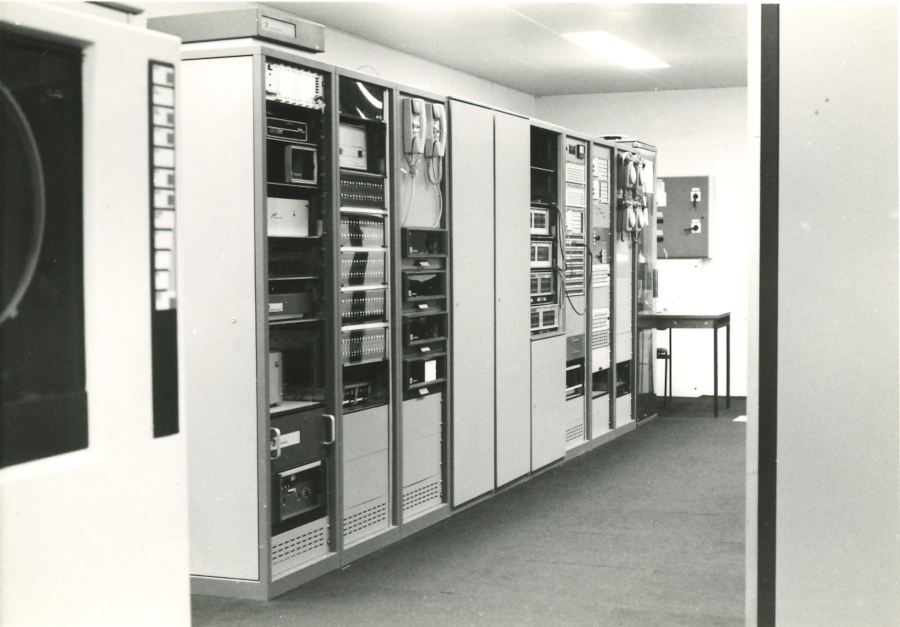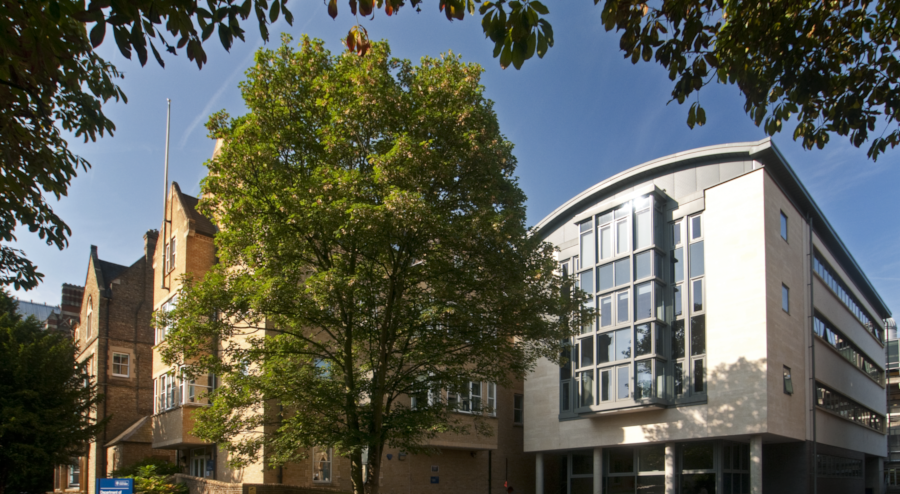

The Department of Computer Science is one of the longest established departments of its type in the country. Formerly known as the Oxford University Computing Laboratory (OUCL), it now delivers world-leading research and teaching, home to undergraduates, postgraduate and doctoral students.

In 1957, Oxford University Computing Laboratory (OUCL) was set up under Leslie Fox. It was soon providing undergraduate lectures in the Faculty of Mathematics, training a number of research students, and running a mainframe computer that provided a computing service to the wider University. During this time, the research efforts of OUCL were directed almost entirely towards numerical analysis. This led to the establishment of the Numerical Analysis Group, which played a significant role in the development of numerical analysis in the United Kingdom.
In 1960, Joan Walsh is celebrated as the first OUCL woman to be awarded a DPhil.
Joan's success represented the beginnings of a longstanding commitment to the central role of women
in the department and computing as a whole.
Read more about Women in Computing at Oxford.
In 1965, the seeds of a radical shift of emphasis and broadening of scope were sown with the foundation of the Programming Research Group (PRG) under Christopher Strachey.
In 1969, OUCL was divided into the Oxford University Computing Service (nowadays IT Services) and an academic section overseen by the Faculty Board of Mathematics.
In 1977, Oxford University Computing Service split from OUCL.
For several years, OUCL's Programming Research and Numerical Analysis Groups pursued their own individual research and teaching initiatives from separate buildings. However, a steady growth in staff numbers, broadening of interest and improved accommodation, would soon see the emergence of a major department with a clear identity and common objectives.
The initial accommodation for OUCL consisted of the converted Victorian houses, 8-11 Keble Road, which were rapidly outgrown.
In 1986, funding was granted, through the University's Campaign for Oxford, for a major extension to the rear of these houses. The resulting Wolfson Building provided purpose-built accommodation to bring staff together and gave OUCL a great sense of achievement and impetus. Further expansion of the department led to a new eScience Building, which also houses the Oxford e-Research Centre.
In 2009, the Numerical Analysis Group moved to the Maths Institute.

In 2011, OUCL became the Department of Computer Science, headed by Bill Roscoe. He said:
This name change is simply to help the world at large understand our role as the University's department of computer science. I am excited that it gives us the opportunity to reach out more easily and tell everyone what we are doing in both teaching and research. When the Computing Laboratory was founded in 1957 it literally was somewhere where the University's scientists came to try things out on this new sort of machine. However we have long since become a large academic department doing world–leading research in many areas related to computing. Bill Roscoe, 1st June 2011
The department now has responsibility for all academic aspects of computing within the University; for teaching, research and collaboration with other departments and industry. Our research attempts both to solve problems using computers and to address problems in the design and programming of the systems themselves. In both areas, it couples rigorous theory with industrial application, and this is reflected in the teaching on our wide range of degrees and courses.
In 2014, Michael Wooldridge, Professor of Computer Science and Senior Research Fellow at Hertford College, took over from Bill Roscoe as Head of Department.
Between October 2018 and September 2019, Professor Peter Jeavons served as Acting Head of Department while Mike had a research sabbatical.
In 2021, Michael Wooldridge was succeeded by Professor Leslie Ann Goldberg, the first woman to serve as Head of Department. Leslie is the head of the Algorithms and Complexity Theory Research Theme and a Senior Research Fellow at St Edmund Hall.
Between September 2025 and August 2026, Professor Ivan Martinovic is serving as Acting Head of Department while Leslie has a research sabbatical. Leslie is retaining the strategic development aspect of the HoD role during her sabbatical.
1960 — The first DPhil is awarded (to a woman, Joan Walsh).
1979 — Master's Programme in Computation starts.
1984 — The undergraduate Computer Science programme launches. (Another woman, Mary Sheeran, a DPhil, is one of the first academics and college fellows hired to teach on it.)
1985 — The new BA in Mathematics and Computation becomes the first undergraduate course at Oxford to be devoted in the main to computing science.
1987 — MEng in Engineering and Computer Science is introduced.
1993 — The Professional Master's Programme (PMP) is established.
1994 — The first intake for the new Honour School of Computation is enrolled. The first Professional Graduate Diploma (PGDip) begins.
1996 — MSc in Mathematics and Foundations of Computer Science begins, along with the graduate Diploma and MSc in Software Engineering, and external and industrial courses.
2002/3 — MSc in Computation becomes MMathCompSci and MCompSci.
2007/8 — Masters in MathCompSci and CompSci become 4-year programmes.
2012 — The first intake is welcomed for a new BA in Computer Science and Philosophy undergraduate degree course.
At the head of the PRG, Christopher Strachey was succeeded by Tony Hoare from 1977 until 1999, and by Samson Abramsky since 2000. In the Numerical Analysis Gorup, Leslie Fox was succeeded by Bill Morton from 1984 until 1997 and by Nick Trefethen since 1997.
Joseph Goguen filled a new position of Chair from 1988, and was succeeded by Richard Brent from 1998 until 2005, and by Georg Gottlob since 2006. Further chairs are now held by Stephen Pulman who joined the department in 1996, and Marta Kwiatkowska and Ian Horrocks who arrived in 2007.
Between 1993 and his retirement in 1999, Hoare's Chair was supported by a generous benefaction from James Martin, who has subsequently been a major benefactor of the University through the Oxford Martin School.